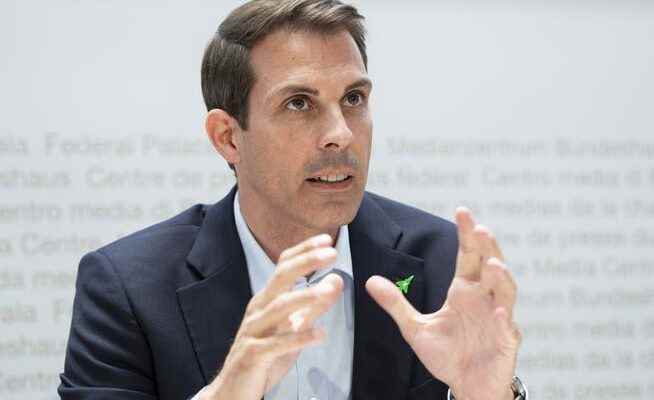The parties see themselves confirmed in their respective interpretations of the policy of neutrality by Moscow’s no to the Swiss protecting power mandate for Ukraine.
FDP President Thierry Burkart says that Russia has not yet described Switzerland as a party to the war.
The report is not a surprise, but it still has considerable news value: the Russian Foreign Ministry does not want to hear about a diplomatic protecting power mandate for Switzerland. From the Kremlin’s point of view, it is no longer neutral since it took on EU sanctions. The local Department of Foreign Affairs (EDA) had agreed with the government in Kyiv to provide consular services for Ukrainian citizens in Russia.
Pfister: “The importance of good offices in the Ukraine war is overestimated in the FDFA”
Moscow’s cold shoulder raises the question in Bundesbern about the actual status of good offices. Not good at all, of course, says SVP National Councilor Franz Grüter. The previous neutrality policy of the Federal Council with the automated adoption of sanctions has meant that Switzerland is no longer perceived as a neutral state. “The course taken by Foreign Minister Cassis has massively weakened Swiss foreign policy,” says the President of the Foreign Affairs Committee of the National Council (APK).
The war in Ukraine, but also the conflict over Taiwan, showed that the world urgently needed the neutral small states to mediate. But that will only work if Switzerland is viewed as neutral by all parties to the conflict. “If Switzerland wants to help defuse the situation here or at least maintain the communication channels between the parties, it must not distinguish between good and bad.” Neutrality and good offices are not ends in themselves, but guarantors of Switzerland’s security and concrete contributions to a more peaceful world.
Switzerland’s policy of neutrality will soon be on the agenda again in the APK. Also in the room are the Federal Council’s neutrality report and an initiative by former Federal Councilor Christoph Blocher. Switzerland is catching up on a debate that has been forgotten in recent years. In any case, for Grüter and the SVP it is already clear today: In the last few months, a lot has been destroyed that has been part of the self-image and the state for decades.
Gerhard Pfister takes a more relaxed view of things. “The importance of good offices in the Ukraine war is overestimated in the FDFA.” The best service Switzerland can do now is to help Ukraine. Pfister also believes that the FDFA’s silent desire to hold peace talks in Switzerland one day is excessive. “Good service means much more than just providing a few hotels for negotiations.” He was amazed that Foreign Minister Cassis was still trying to identify actions that could be used by the media. The decision at that time to show solidarity with Ukraine and to take on the sanctions was “the very least” that Switzerland could have done. One could live with the fact that Russia was angry.
Greens praise cassis
Thierry Burkart is also unimpressed. Russia has put Switzerland on a list of “unfriendly countries” but has never called it a war party, says the FDP President. “The only ones who do this non-stop are the representatives of the SVP.” Russia rejects the protection mandate, not because of Switzerland’s policy of neutrality, but because the Kremlin is currently simply not interested in signaling any concessions to the Ukrainian government. This is shown by the Swiss protecting power mandate for Russia and Georgia, which Moscow still adheres to. Burkart praises “his” Federal Councilor Cassis and the FDFA for their tireless efforts to get both parties to the conflict to talk to each other again.
There is also praise for Cassis from the Greens. “We welcome his proposed solution,” says National Councilor Sibel Arslan. The fact that Switzerland was asked by Ukraine for the protecting power mandate shows that it is perceived as a “credible partner”. “It is all the more worrying that Russia is refusing this outstretched hand,” says the foreign policy expert.
